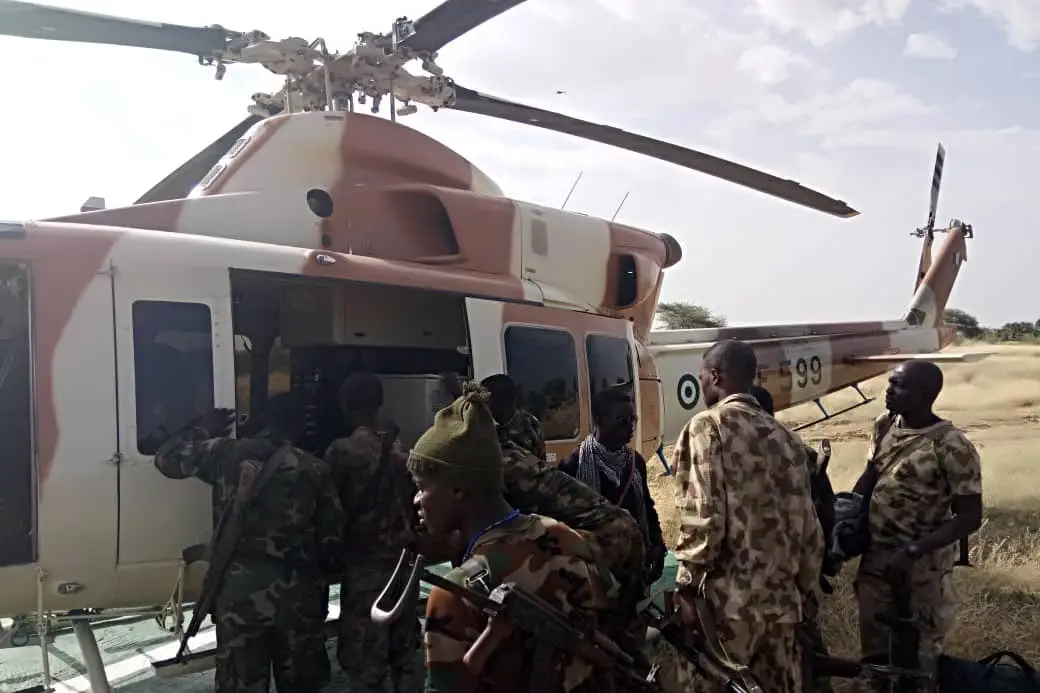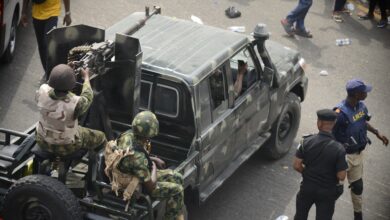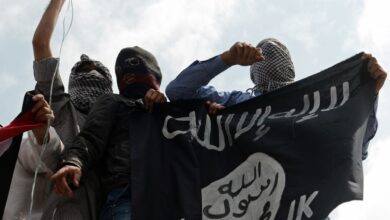Boko Haram launched a large assault on a military base in Gashigar in Nigeria’s remote northeast region, killing one soldier and injuring four, defense officials said Sunday.
The attack on 145 Battalion in Gashigar, Borno State, began on Saturday, October 27 and continued into early Sunday morning, Nigerian Air Force spokesperson Air Commodore Ibikunle Daramola said in a statement posted on Facebook.
A Nigerian Air Force Intelligence, Surveillance and Reconnaissance platform that was on a mission elsewhere and two Mi-35 helicopter gunships were sent to Gashigar, which is around 43 km (23 miles) northeast of Damasak near the Niger river in northern Borno state.
The ISR platform was joined by another from the Nigerien Air Force and they both identified militants “in 13 gun trucks” advancing towards the camp from two different directions, the statement said. The ISR platforms directed fire from the Mi-35 helicopters and troops on the ground towards the militants, who were forced to retreat.
The militants regrouped outside the camp “but were again engaged by the helicopter gunships and sent scampering in different directions, with several of them killed or injured in the process.”
“One soldier was killed in action while four others were wounded,” the Nigerian army said in a statement posted on Facebook.
JUST IN: Troops Repel BHT attack at Gashigar. BHT were completely routed 27 October 2018 when they attempted to infiltrate 145 Battalion location at Gashigar Borno State. Details https://t.co/4QIFX6pZKb pic.twitter.com/MCAkvqgQmg
— Nigerian Army (@HQNigerianArmy) October 28, 2018
On September 25, the same battalion of Nigerian troops repelled a Boko Haram attack in Gashigar.
Boko Haram intensifies campaign in northeast Nigeria
Boko Haram has lately intensified its armed campaign, launching a number of major assaults in Nigeria’s remote northeast region. It rarely claims responsibility for attacks.
Attacks on military bases in Nigeria have been on the increase, with at least nine since July, mostly in the northern part of Borno state, near the shores of Lake Chad.
Scores of soldiers have been killed, injured or are missing in the latest wave of attacks, but the military has repeatedly denied or played down losses.
Just this month, six soldiers were injured as troops foiled an attempt by Boko Haram fighters to overrun a military base in Arege on October 12, while four days earlier, Boko Haram militants launched a seven-hour attack on a military base in Metele near the border with Niger. According to the military, seven soldiers were killed and 16 wounded in that attack, but civilian militia sources said 18 soldiers were killed.
Boko Haram is divided into two factions that have competing goals and operational methods. One, led by Abubakar Shekau, is notorious for suicide bombings and indiscriminate killings of civilians. The other, known as Islamic State West Africa Province and led by Abu Mus’ab Al-Barnawi, largely focuses on attacking military and government targets.
ISWAP has in recent months been blamed for the increasing attacks on military bases in Borno and nearby Yobe state. It is dominant around the shores of Lake Chad, while the Shekau-led faction is concentrated in rural areas of Borno state.
The Combatting Terrorism Center at West Point in August estimated that ISWAP has around 3,500 fighters. The Shekau faction could consist of up to 1,500 militants.
More radical elements are said to have recently taken over the ISWAP leadership, killing the group’s de fatco leader, as well as another commander who allegedly planned to surrender along with 300 hostages. ISWAP previously vowed to hit only military and government “hard” targets.
The recent surge undermines repeated claims by the military that the insurgent group has been defeated, and Nigeria’s President Muhammadu Buhari’s insistence that Boko Haram are a spent force as he gears up for elections next year.
The jihadist insurgency is in its ninth year and has left more than 27,000 people dead and displaced 2.6 million. Although Boko Haram no longer controls the swathes of territory in northeast Nigeria it did at its 2014 height, its militants still pose a threat to the region.
Dozens killed in joint Niger-Nigeria military crackdown on criminal gangs
With reporting from AFP











